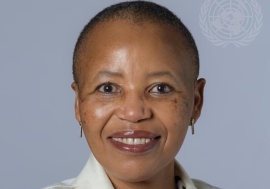Are women better peacemakers?
Are women naturally more peaceful than men, and therefore better peacemakers? Not necessarily, three experts told Africa Renewal -- but societal gender roles and the different experiences men and women have as a result can contribute to women's effectiveness at the negotiating table. One important difference between men and women, says Ms. Bineta Diop, president of the non-governmental organization Femme Africa Solidarite, is that while men are accustomed to wielding authority, women are, of necessity, better at compromise and consensus-building. "In our society, in Africa, you will see the women working together for health care and education and food. They are the ones taking care of the community, and they bring those values of solidarity, of listening, to the [peace] table. They bring the men around to those issues."
Ms. Ellen Johnson Sirleaf, co-author of the independent experts' assessment on women, war and peace for UNIFEM, noted that while men seek political power in order to rule, women are generally excluded from ruling circles and see power as a means to other ends, rather than an end in itself. "Women are more concerned about people. They are mothers. They grow up with children. They are in the homes carrying the burden of the home and family." From that experience, she said, "women bring a sensibility, a sensitivity, to those things which bring peace."
It is not that women do not want full participation in the political process, added UNIFEM Executive Director Noeleen Heyzer. "They do! Women want power as much as men. But it's power for what? They are having such difficulties raising their families and bringing up the children that they want a better and safer way. You can't do that without resources, without authority, without power."











